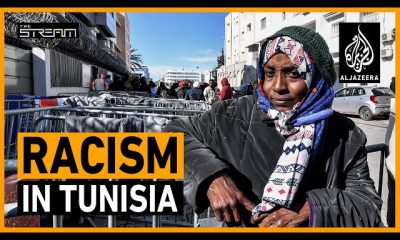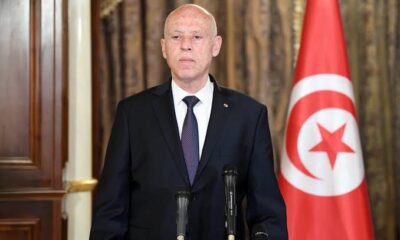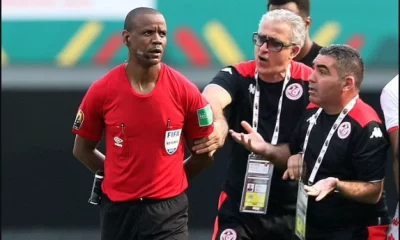NEWS
Violence flares after Tunisians rally to mark revolution’s anniversary

Teargas used in suburb where protesters accuse Tunisian government of undermining Arab spring’s legacy

Thousands of Tunisians flooded into the centre of Tunis on Sunday to celebrate the seventh anniversary of the revolution that ousted president Zine al-Abidine Ben Ali, capping a week of protests against the government they say now threatens its legacy.
After a peaceful day, violence broke out in the evening. Police used teargas on dozens of young protesters in the deprived Tunis suburb of Ettadhamen, just hours after the president visited to launch social changes aimed at quelling unrest.
Beji Caid Essebsi made his first trip to the area after days of mass protests across the country, with people taking to the streets in opposition to a harsh new budget which pushes up the prices of necessities.
Essebsi’s visit to a youth centre was intended to soothe tensions in Ettadhamen, which last week endured night-time clashes between young protesters and police. He handed out loans to young people and announced improved aid for the poor and healthcare provisions.
However, like many of this week’s demonstrations around the country, violence erupted after dark, prompting another crackdown of the sort that has been condemned by critics as being too heavy handed. At least one person has been killed this week, dozens injured and around 800 people detained, according to the interior ministry.
The government said the increases in prices and tax were necessary to balance the books and meet terms demanded by an IMF loan that is helping keep the country afloat.

But for Tunisians frustrated by years of economic stagnation, made worse after terror attacks in 2015 decimated the vital tourism industry, the prospect of more expensive food, fuel, internet and other goods was enough to send many back on to the streets.
Seven years after dictator Ben Ali fled abroad, the country has cycled through six governments. Too many of its citizens have seen no sign of the hoped-for transformation in the economy and their lives.
“Tunisia is at a crossroads,” said Messaoud Romdhani, a veteran campaigner against Ben Ali and president of the Tunisian Forum for Economic and Social Rights. “We need to keep the pressure up, most of our social and economic rights have not been delivered.”

The country could become a beacon for a struggling region – if the government can correct its course – or slip into the chaos that has engulfed Syria, Libya and others, he warned.
“The key word of the revolution is dignity and people still feel the government doesn’t see their problems. They think they have been neglected on purpose.”
Tunisia, the country where the 2011 Arab spring began, has been its one remaining bright spot. Other countries around the region where dictatorships were overthrown have since plunged into civil war or are once more under autocratic control.
Many in central Tunis’ leafy Habib Bourguiba avenue said they had turned out simply to celebrate. “I’m here for Tunisia and freedom,” said 50-year-old Chadia Zneida, who had to make a 10-hour round trip to join the crowds. “We have freedom of speech, to talk, and the rest will gradually come.”
There were many children among those waving flags, singing and dancing, their parents unconcerned by violence at previous protests, representing the first generation for whom the revolution is just another piece of history.
“Those who didn’t come today will regret it,” said 13-year-old Ala Meddeb, joining the rally with her father and her sister Eya and her father. Teenagers now, the high school students were only six and eight when Ben Ali fled and say they have no memories of his rule or departure, but still wanted to celebrate the revolution. “Even if I don’t remember, I heard life was difficult before, and there was torture.”

But there was also anger, mostly at the feeble state of the economy, corruption and persistent unemployment. “The revolution had three slogans: “Freedom, employment, dignity,” said activist Haitham Guesmi. “We succeeded in winning freedom, of speech, assembly, to protest etc. But we are still looking for employment and dignity.”
Union activists marching past chanted: “The government tricked people.”
Among them was 40-year-old Muhammed Ali, a factory worker marching with hundreds of other trade union members. He works at a tyre company that was privatised for what he says was a token amount, in an outrageous act of crony capitalism. About 900 of its 1,500 workers have been on strike since last summer. “My problem is not the revolution, it’s the government,” he said.
Issam, a 30-year-old military technician, enjoying a coffee at the edge of the protests, did not agree. Tunisia had paid too high a price for democracy, he said.
“Ben Ali’s time was better,” he said with a shrug, adding that if he was forced to choose now, he would have stuck with the old regime. “As a president, as a system, I didn’t like it, but talking just about the economy, in his time it was better.”
Essebsi’s Sunday visit to Ettadhamenwas first time in his 92 years that he had made a trip to the working class neighbourhood that proudly describes itself as the heart of the revolution. It is also often at the heart of violence.
The visit produced good television footage, but left behind a wave of cynicism. “Its all just like the cinema, for show,” said one father, pointing to a climbing frame uprooted from the mud of a newly opened playground just a couple of hours after he left, now lying toppled on its side.
Just a couple of blocks away, young men apparently high on hashish stared at a new street lamp installed two days before the president’s visit. “This isn’t the real Ettadhamen, they have been cleaning up for a week,” said one.
Students from the area allowed inside the centre after the president’s visit said it was crammed, full of exciting equipment, such as PlayStations and a cinema, but wondered if they would be let in again.
“When he came, he didn’t speak to us, he spoke to the cameras. He is scared of Ettadhamen,” said 17-year-old Feres who had broken off from exam revision to confront the president.
“We tried to talk to him and the policemen insulted us. Tunisia is our country, but this is not our government. We lie here in poverty and they despise us.”




















